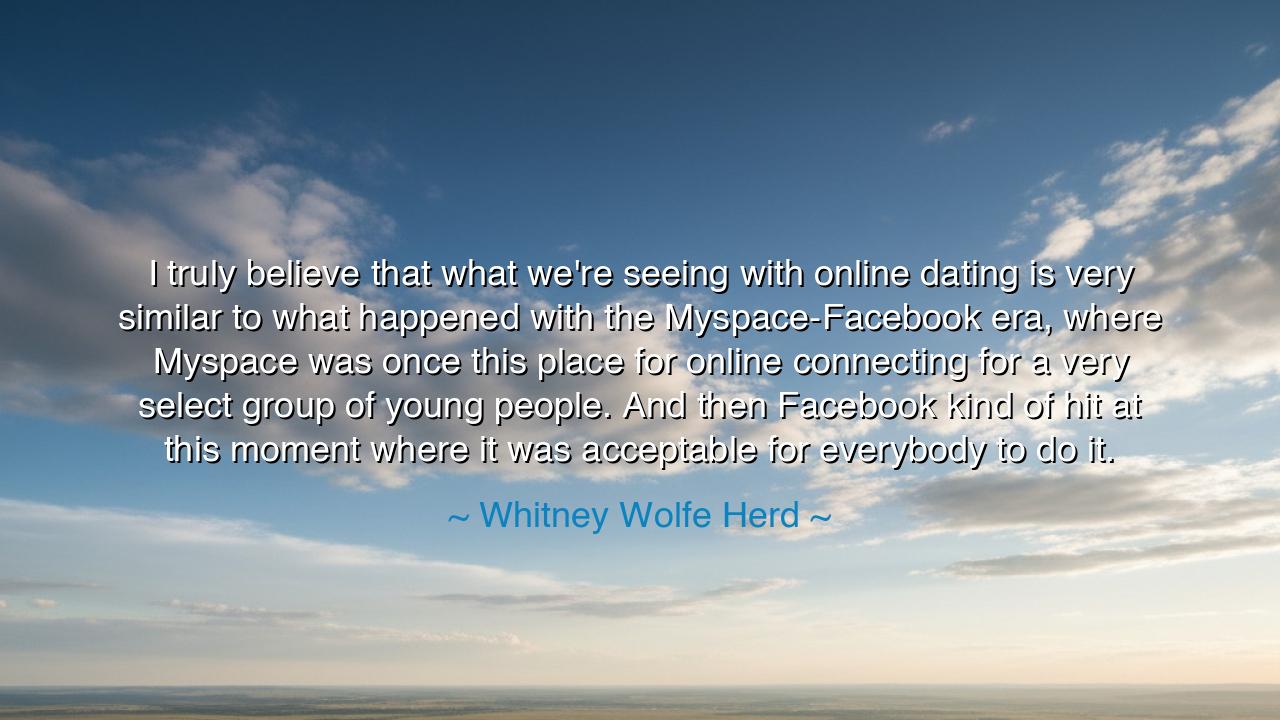
I truly believe that what we're seeing with online dating is very
I truly believe that what we're seeing with online dating is very similar to what happened with the Myspace-Facebook era, where Myspace was once this place for online connecting for a very select group of young people. And then Facebook kind of hit at this moment where it was acceptable for everybody to do it.






When Whitney Wolfe Herd said, “I truly believe that what we’re seeing with online dating is very similar to what happened with the Myspace-Facebook era, where Myspace was once this place for online connecting for a very select group of young people. And then Facebook kind of hit at this moment where it was acceptable for everybody to do it,” she was not merely speaking of technology, but of human evolution — of how societies move from hesitation to acceptance, from novelty to necessity. Beneath her words lies a profound understanding of change: that every great transformation begins as something small, often ridiculed or misunderstood, until time reveals its deeper purpose. Her insight speaks not only to the world of digital connection, but to the enduring rhythm of progress itself — the eternal dance between fear and innovation, between what is new and what becomes natural.
The origin of her words comes from her own journey as the founder of Bumble, a company that redefined the way people meet and build relationships online. Wolfe Herd saw in the rise of online dating the same pattern that had played out in the early days of social networking — a movement from skepticism to cultural revolution. Once, to find love through a screen was seen as desperate or strange; now, it is an accepted and often celebrated part of modern life. Her comparison between Myspace and Facebook is more than technological — it is archetypal. For every new idea that challenges the order of things must first dwell in the shadows of misunderstanding before it is embraced as wisdom.
The ancients would have recognized this pattern well. The philosopher Plato once described human learning as the turning of the soul from darkness toward light. The same can be said of every innovation in human history — from the printing press to the telephone, from electricity to the Internet. At first, each was met with fear, then with curiosity, and finally with faith. Myspace was the dawn — chaotic, youthful, daring — while Facebook became the daybreak, bringing with it the calm acceptance of the new order. Wolfe Herd’s observation is thus a meditation on the cycles of change: how humanity learns to trust the tools it once feared, and how progress, once ignited, becomes unstoppable.
Consider the story of Galileo Galilei, who dared to turn his telescope toward the heavens and proclaim that the Earth was not the center of the universe. In his time, his discovery was condemned as heresy. Yet what was once forbidden truth became the foundation of modern science. In the same way, online connection — once doubted, dismissed, or mocked — has become an essential force in shaping how humans communicate, love, and belong. Whitney Wolfe Herd, standing at the crossroads of technology and emotion, perceives that we are living through another such shift. What was once a curiosity has now become a culture.
Her words also carry a moral wisdom about acceptance and human growth. She reminds us that people often fear what they do not yet understand, and that innovation requires not only intelligence, but patience — the patience to let society catch up to vision. The early users of Myspace, like the early adopters of online dating, were pioneers — often mocked, but necessary. They built the bridge others would later walk upon. Wolfe Herd honors this truth: that every transformation begins with the brave few who dare to embrace the unfamiliar. As Facebook once made online socializing universal, so too has online dating moved from the margins to the mainstream — teaching humanity that connection can transcend place, time, and even prejudice.
There is also in her reflection a deeper insight into the nature of belonging. Myspace and Facebook were not just websites; they were mirrors of the human desire to be seen and known. Likewise, online dating is not merely an algorithmic convenience — it is the continuation of an ancient quest: the search for companionship, the yearning for understanding. What has changed is not the heart, but the tools with which it reaches outward. Wolfe Herd’s comparison reveals that technology, at its best, serves to amplify what is already eternal — our need to connect, to love, to share our stories with one another.
The lesson of her words is timeless: do not fear change, for every era’s innovation is tomorrow’s tradition. What is strange today becomes sacred tomorrow. The ancients would say that the wise person walks not behind progress, but beside it — learning, adapting, guiding it toward virtue. Just as Facebook made social connection a universal experience, so too may new technologies make love, understanding, and empathy more accessible than ever before. But this requires mindfulness: to use tools not as masters of us, but as servants of the heart.
Thus, Whitney Wolfe Herd’s words remind us that the evolution of connection — from Myspace to Facebook, from awkward beginnings to global belonging — is not just the story of the Internet; it is the story of humanity itself. Each age finds new ways to express the same old truths: that we long to be seen, to be loved, to belong. The form may change, but the flame remains eternal. And so she teaches us: welcome the new, honor the old, and remember that behind every screen, every profile, and every innovation beats the same timeless heart — the heart that seeks another and says, I see you.






AAdministratorAdministrator
Welcome, honored guests. Please leave a comment, we will respond soon